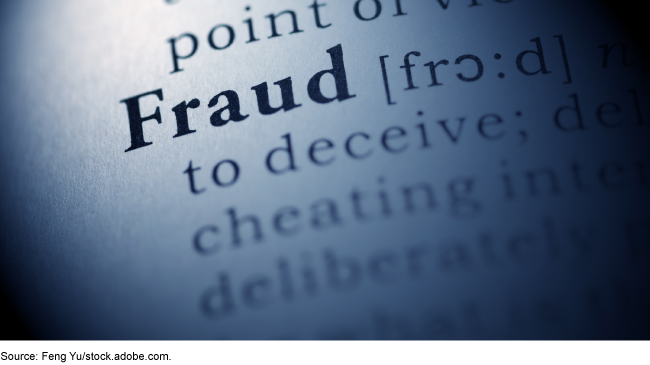COVID-19: Key Elements of Fraud Schemes and Actions to Better Prevent Fraud
Fast Facts
From March 2020 through June 2023, at least 1,399 individuals or businesses were found guilty or liable in fraud cases involving federal COVID-19 programs—with more charges pending.
We testified that many fraud schemes in these programs included beneficiary fraud—lying to obtain benefits—or identity fraud—stealing someone else's personal information to obtain benefits.
To do this, fraudsters manipulated documents, made false declarations, and created fictitious entities to apply for benefits.
Agencies can better prevent fraud by following leading practices in our Fraud Risk Framework and using the Antifraud Resource to understand federal fraud.

Highlights
What GAO Found
Most COVID-19 relief funds went to the intended recipients in the intended amounts. In other instances, significant funds went to those who engaged in fraud schemes. Federal fraud schemes consist of five key elements: (1) affected program, (2) participants, (3) types of fraud activities, (4) mechanisms to execute fraudulent activities, and (5) impacts. These elements represent the highest-level components in GAO's Conceptual Fraud Model. The model provides a common language and structure for describing fraud schemes—including those affecting COVID-19 relief programs—to support agency efforts to combat fraud.
Key Elements of an Example of a Fraud Scheme Involving Multiple COVID-19 Relief Programs

Federal agencies did not strategically manage fraud risks and were not adequately prepared to prevent fraud when the pandemic began. While eliminating all fraud is not a realistic goal, resources and requirements exist to support strategic fraud risk management. For example, GAO's Fraud Risk Framework and Antifraud Resource provide leading practices and interactive tools, respectively, to help agencies combat fraud. GAO's 142 recommendations to agencies to align their efforts with fraud risk management leading practices also provide a roadmap for action. GAO has also suggested actions Congress can take, such as reinstating agencies' reporting on fraud risk management and enhancing data analytic capabilities. These congressional actions and agencies' use of GAO resources to strategically manage fraud risk would position them to better prevent fraud in both normal operations and in emergencies.
Why GAO Did This Study
Since March 2020, Congress and the Administration have provided trillions of dollars in COVID-19 relief funding to help the nation respond to and recover from the pandemic. Agencies across the federal government acted quickly to stand up new programs and greatly scale up existing programs.
The unprecedented demand for benefits and the need to quickly implement or expand programs increased the risk of fraud during the pandemic. There have also been cases of funds paid to those who sought to defraud the government. For example, from March 2020 through June 2023, at least 1,399 individuals or entities were found guilty or liable for fraud-related charges in cases involving federal COVID-19 relief programs.
Managing fraud risk is the responsibility of program managers and includes assessing the potential for fraud and implementing strategies to appropriately mitigate related fraud risks. Better understanding the nature of federal fraud schemes and the resources available to combat them can enhance agency efforts to prevent, detect, and respond to fraud risk during normal operations and emergencies.
This testimony discusses (1) key elements of federal fraud schemes and examples of schemes involving COVID-19 relief funds and (2) actions agencies and Congress can take to better prevent fraud during normal operations and emergencies.
GAO reviewed its prior COVID-19 findings and recommendations on internal controls and fraud risk management practices.
For more information, contact Rebecca Shea at (202) 512-6722 or shear@gao.gov.
